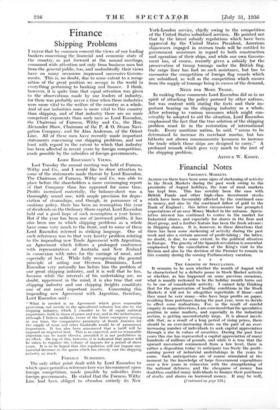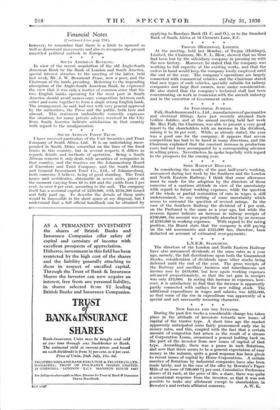Financial Notes
CHEERFUL MARKETS.
ALTHOUGH there have been some signs of slackening of activity in the Stock Markets during the past week owing to the proximity of August holidays, the tone of most markets has kept firm. This has notably been the case with British Funds and other high-class investment stocks which have been favourably affected by the continued ease in money, and also by the continued inflow of gold to the Bank of England ; this latter circumstance has prompted expectations of an easy Money Market in the autumn. Specu- lative interest has continued to centre in the market for Industrial shares, and especially for shares in the Iron and Steel group, and a further feature has been the fresh advance in Shipping shares. It is, however, in these directions that there has been some slackening of activity during the past week and also a certain amount of profit-taking ; the latter, no doubt, is due, to some extent, to the political situation in Europe. The gravity of the Spanish revolution is somewhat emphasised by the cancellation of the King's visit to the Riviera and also by the decision of the Premier to remain in this country during the coming Parliamentary vacation.
* * * *
THE GROWTH OF SPECULATION.
It remains to be seen whether the month of August will be characterised by a definite pause in Stock Market activity or whether, as has happened on some previOus occasions, what is usually reckoned to be the holiday month turns out to be one of considerable activity. I cannot help thinking that for the preservation of healthy conditions in the Stock Markets it will not be altogether regrettable if those—and they must be very many—who have large profits on paper, resulting from purchases during the past year, were to decide to effect some realisations. For, as the result of careful enquiry in many directions, I am convinced that the speculative position in some markets, and especially in the industrial section, is getting uncomfortably large. It is almost inevit- able that, as a result of a long period of rising prices, there should be an ever-increasing desire on the part of an ever- increasing number of individuals to seek capital appreciation through a rise in values of securities. During the past four years this rise has represented a capital appreciation of many hundreds of millions of pounds, and while it is true that the upward movement commenced from a low level, there is rather a disposition today to anticipate too freely the profit- earning power of industrial undertakings in the years to come. Such anticipations are of course stimulated at the moment by the knowledge of large Government expenditure over a few years in connexion with the strengthening of the national defences; and the cheapness of money has doubtless enabled many inclividuals to `finance their purchases of stocks and shares on borrowed money. ,It may be well, (Continued on pale 218.)
Financial Notes
(Continued from page 216.)
however, to remember that there is a limit to upward as well as downward movements and also to recognise the present unsettled political outlook in Europe.
* *
SOUTH AMERICAN BANKING.
In view of the recent acquisition of the old An glo-South American Bank by the Bank of London and South America, special interest attaches to the meeting of the latter, held last week, Mr. J. W. Beaumont Pease, now a peer, and the Chairman of the bank, presiding. Referring to the impending absorption of the Anglo-South American Bank, he expressed the view that it was only a matter of common sense that the two English banks operating for the most part in South America should avoid unnecessary competition between each other and come together to form a single strong English bank. The arrangement, he said, had met with very general approval by the authorities, the Press and the public, both here and abroad. This statement undoubtedly correctly expresses the situation, for many private advices received in the City from South America indicate satisfaction in that country with regard to the amalgamation.
* * *
SOUTH AFRICAN FIXED TRUST.
I have received particulars of the Unit Securities and Trust Company of South Africa, Ltd. It is an undertaking incor- porated in South Africa somewhat on the lines of the fixed trusts in this country, but in several respects it differs as regards details and methods of operation. Being a South African concern it only deals with securities of companies in that country, and the trustees are the Johannesburg Board of Executors and Trust Company, and the South African and General Investment Trust Co., Ltd., of Johannesburg, both concerns, I believe, being of good standing. The Trust issues unit certificates, obtainable in seven units, prices at the moment varying from £8 to £28 and the yields from 5 per cent, to over 9 per cent. according to the unit. The company itself has a nominal capital of £250,000, with £116,500 issued and fully paid up. To describe the details of these units would be impossible in the short space at my disposal, but I understand that a full official handbook can be obtained by
applying to Barclays Bank (D. C. and 0.), or to the Standard Bank of South Africa at 10 Clements Lane, E.C.
* * * * TROJAN (HOLDINGS), LIMITED.
At the meeting, held last Monday, of Trojan (Holdings), Limited, the Chairman, Mr. F. L. Blow, showed that no time had been lost by the subsidiary company in pressing on with the new factory. Moreover, he stated that the company was working to full capacity at the existing works, and that the orders in hand would keep the company busily employed until the end of the year. The company's operations are largely connected with commercial vehicles and the Chairman stated that new types of such vehicles, specially suitable for railway companies and large fleet owners, were under consideration. He also stated that the company's technical staff had been concentrating on work in connexion with the aircraft industry and in the execution of Government orders.
* * * * AN INDUSTRIAL JUBILEE.
Falk, Stadelmann and Co., Ltd., manufacturers of gas mantles and electrical fittings, have just recently attained their Golden Jubilee, and at the annual meeting held last week Mr. Max Falk, the Chairman, was able to present a very good report to the shareholders with an increase in the dividend, raising it to 10 per cent. While, as already stated, the year was a good one for the company, it appears that severe competition has had to be faced in many directions, and the Chairman explained that the constant increase in production costs had not been accompanied by a corresponding advance in selling prices. Nevertheless, he spoke hopefully with regard to the prospects for the coming year.
* * * * SOME RAILWAY RESULTS.
In considering the results of the past half-year's working, announced during last week by the Southern and the London and North Eastern Railway, I think that some allowance must be made for the adoption by the directors of those concerns of a cautious attitude in view of the uncertainty with regard to future working expenses, while the question of the whole or partial restoration of cuts in wages is still undetermined, to say nothing of some uncertainty which seems to surround the question of revised ratings. In the case of the Southern Railway the dividend of 1 per cent. on the Preferred is the same as a year ago, but while the revenue figures indicate an increase in railway receipts of £190,000, the amount was practically absorbed by an increase of £183,000 in working expenses. With regard to the rating position, the Board state that the company is still paying on the old assessments and £125,000 has, therefore, been deducted on account of estimated over-payments.
* * * * L.N.E.R. STATEMENT.
The directors of the London and North Eastern Railway have also announced dividends at the same rates as a year ago, namely, the full distributions upon both the Guaranteed Stocks, consideration of dividends upon other stocks being deferred until the end of the year. The gross receipts of the Railway and ancillary business and miscellaneous net income rose by £819,000, but here again working expenses advanced proportionately, so that the net gain in receipts was only £13,000. In noting this increase in expenses, how- ever, it is satisfactory to find that the increase is apparently partly connected with outlays for new rolling stock. The additional expenditure in wages and salaries was £222,000, so that some of the rise in expenditure was apparently of a special and not necessarily recurring character.
* * * * NEW ISSUES AND THE INVESTOR.
During the past few weeks a considerable change has taken place in the attitude of investors towards new issues of capital of the trustee type. A short time ago the market apparently anticipated some fairly pronounced early rise in money rates, and this, coupled with the fact that a certain amount of congestion had arisen as the result of a stream of Corporation Loans, occasioned a general holding back on, the part of the investor from new issues of capital of that type. Accordingly, there was a pause in such flotations, and now that there seems to be a general expectation of easy money in the autumn, quite a good response has been given to recent issues of capital by Home Corporations. A certain number of flotations by industrial companies have also been made lately, and in the case of the offer by Bowater's Paper Mills of an issue of 700,000 7i per cent. Cumulative Preference shares a£]. each, at the price of 30s. a share, there was quite a sensational response from the investor, so that it was not possible to make any allotment except to shareholders in
Bowater's and certain affiliated concerns. A. W. K.







































 Previous page
Previous page